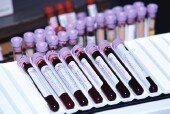
WEDNESDAY, Aug. 18 (HealthDay News) — A new method for screening for ovarian cancer appears to be 100 percent effective in early testing, researchers say.
The approach relies on just a single drop of blood, the molecules of which are vaporized and electrified before being subjected to a high-tech analysis called mass spectrometry.
The Georgia Institute of Technology researchers said they found the approach to be foolproof in identifying cases of ovarian cancer in initial trials involving 94 subjects. Forty-four had ovarian cancer and 50 had benign conditions.
“Because ovarian cancer is a disease of relatively low prevalence, it’s essential that tests for it be extremely accurate,” John F. McDonald, chief research scientist at the Ovarian Cancer Institute in Atlanta and a professor of biology at Georgia Tech, said in a news release from the school. “We believe we may have developed such a test.”
McDonald and his colleagues report their finding online in the current issue of Cancer Epidemiology, Biomarkers & Prevention Research.
The researchers pointed out that ovarian cancer is asymptomatic in its early stages, prompting a need for a screening approach that can identify the onset of this “silent killer.”
Last spring, British researchers speaking at the American Society of Clinical Oncology meeting discussed another potential ovarian cancer screening method. That one uses mathematical models to better pinpoint risk for the disease among postmenopausal women.
While that method also demonstrated very high (99.7 percent) accuracy, studies assessing its effectiveness are still underway.
The Georgia Tech method, which appeared to register no false positive or negative results, was developed by Facundo Fernandez, an associate professor in the school of chemistry and biochemistry.
The Georgia team is now testing the approach among 500 patients.
“The caveat is we don’t currently have 500 patients with the same type of ovarian cancer, so we’re going to look at other types of ovarian cancer,” Fernandez said in the news release. “It’s possible that there are also signatures for other cancers, not just ovarian, so we’re also going to be using the same approach to look at other types of cancers. We’ll be working with collaborators in Atlanta and elsewhere.”
Dr. Robert J. Morgan, director of the gynecologic oncology program at the City of Hope Cancer Center in Duarte, Calif., said that if the new screening method holds up upon further investigation, it could prove to be “earth-shatteringly important.”
“The problem with ovarian cancer in general is that about 80 percent of patients are diagnosed at very advanced stages of the disease,” he explained, “because at the present time there is no proven screening method that has shown to be effective at catching the disease at an early stage.”
“And among patients that are diagnosed at late stages, only subsets have any chance of cure,” Morgan noted. “For example, Stage 3 disease chances drop to the 15 to 20 percent range in terms of long-term disease survival.”
“So, if this particular technique now being studied translates into a once-a-year blood test that could actually be sensitive to very specific biomarker patterns linked to ovarian cancer at an early stage, then it would be a huge improvement in ovarian cancer treatment, even if it is only applicable to high-risk groups. So, this approach is absolutely worthy of further investigation.”
More information
For more on ovarian cancer, visit the American Cancer Society.

